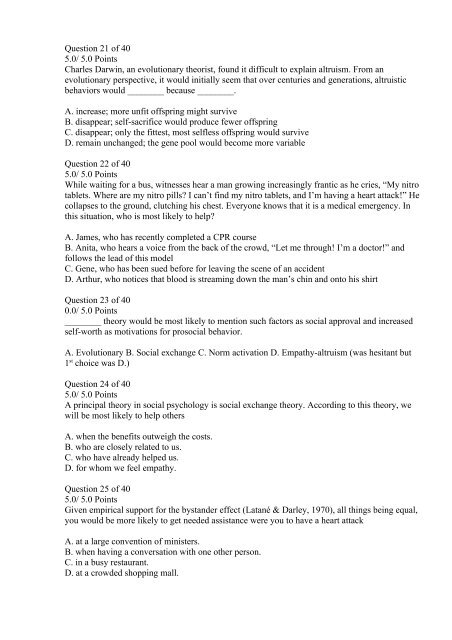S06 SOCIAL PSYCHOLOGY EXAM 7 Answers (Ashworth College)
Create successful ePaper yourself
Turn your PDF publications into a flip-book with our unique Google optimized e-Paper software.
Question 21 of 40<br />
5.0/ 5.0 Points<br />
Charles Darwin, an evolutionary theorist, found it difficult to explain altruism. From an<br />
evolutionary perspective, it would initially seem that over centuries and generations, altruistic<br />
behaviors would ________ because ________.<br />
A. increase; more unfit offspring might survive<br />
B. disappear; self-sacrifice would produce fewer offspring<br />
C. disappear; only the fittest, most selfless offspring would survive<br />
D. remain unchanged; the gene pool would become more variable<br />
Question 22 of 40<br />
5.0/ 5.0 Points<br />
While waiting for a bus, witnesses hear a man growing increasingly frantic as he cries, “My nitro<br />
tablets. Where are my nitro pills? I can’t find my nitro tablets, and I’m having a heart attack!” He<br />
collapses to the ground, clutching his chest. Everyone knows that it is a medical emergency. In<br />
this situation, who is most likely to help?<br />
A. James, who has recently completed a CPR course<br />
B. Anita, who hears a voice from the back of the crowd, “Let me through! I’m a doctor!” and<br />
follows the lead of this model<br />
C. Gene, who has been sued before for leaving the scene of an accident<br />
D. Arthur, who notices that blood is streaming down the man’s chin and onto his shirt<br />
Question 23 of 40<br />
0.0/ 5.0 Points<br />
________ theory would be most likely to mention such factors as social approval and increased<br />
self-worth as motivations for prosocial behavior.<br />
A. Evolutionary B. Social exchange C. Norm activation D. Empathy-altruism (was hesitant but<br />
1 st choice was D.)<br />
Question 24 of 40<br />
5.0/ 5.0 Points<br />
A principal theory in social psychology is social exchange theory. According to this theory, we<br />
will be most likely to help others<br />
A. when the benefits outweigh the costs.<br />
B. who are closely related to us.<br />
C. who have already helped us.<br />
D. for whom we feel empathy.<br />
Question 25 of 40<br />
5.0/ 5.0 Points<br />
Given empirical support for the bystander effect (Latané & Darley, 1970), all things being equal,<br />
you would be more likely to get needed assistance were you to have a heart attack<br />
A. at a large convention of ministers.<br />
B. when having a conversation with one other person.<br />
C. in a busy restaurant.<br />
D. at a crowded shopping mall.

















